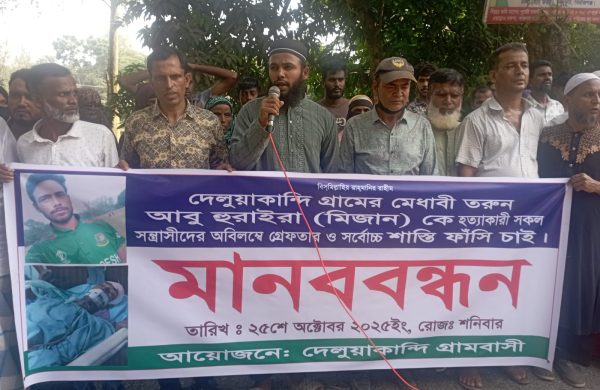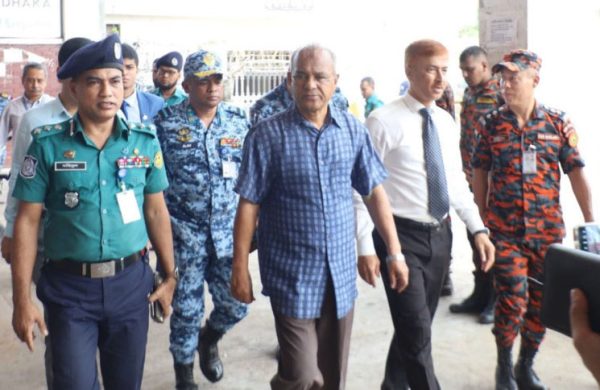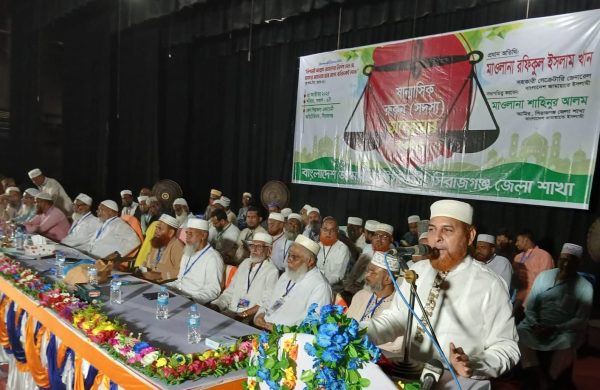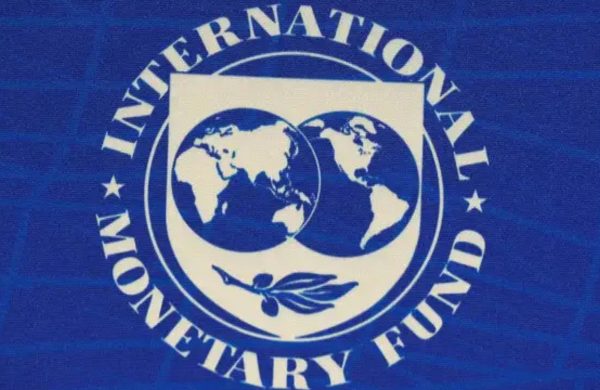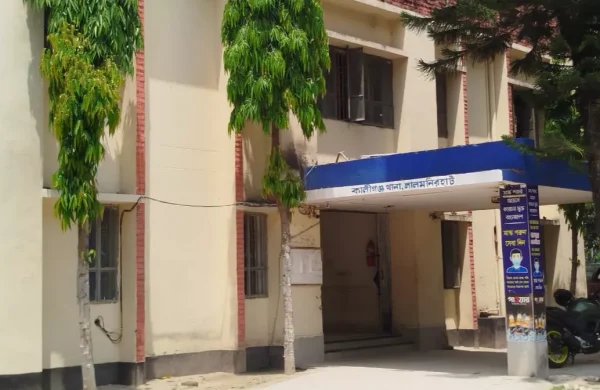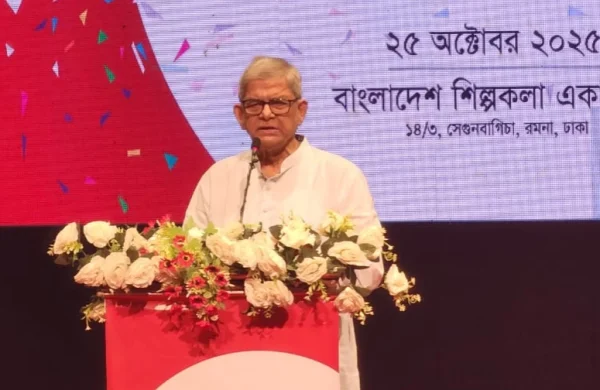Public administration debate intensifies further
- Update Time : Saturday, October 25, 2025
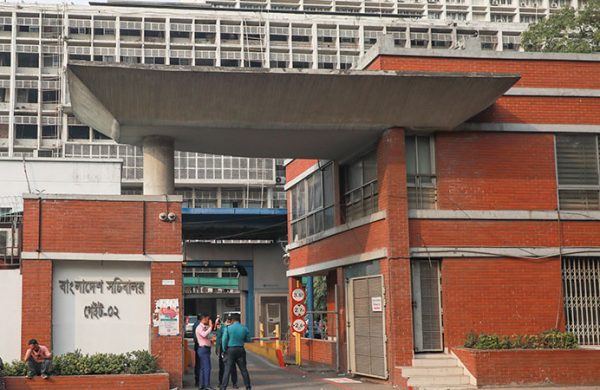
TDS Desk:
As the national election approaches, preparations are underway for reshuffles in several key government offices. However, questions are being raised over the neutrality of some senior officials holding crucial positions in the administration. Many observers believe these officials could influence the electoral environment and the balance within the bureaucracy. Recently, political parties have exchanged allegations over the impartiality of top officials serving in important government departments. Nearly all of them belong to the 1982 batch of the administration cadre—a group whose members have repeatedly come under scrutiny since the formation of the Interim Government.
A significant number of serving bureaucrats have been accused of working in favor of various political parties. The BNP claims that some officials are aligned with Jamaat-e-Islami, while Jamaat alleges that many of them are loyal to the BNP. Meanwhile, the NCP and several other parties argue that many administrative officials are serving the interests of both the BNP and Jamaat. Transfers, promotions, and postings in the civil service are widely believed to be driven by political considerations.
Analysts say that after the formation of the Interim Government, the bureaucracy became mired in controversy due to the continuation of previous policies, indecision in governance, lack of firm measures, and appointments influenced by political loyalty. The absence of professional and competent postings, they note, has eroded public trust in the civil service. During the BNP–Jamaat coalition era, many officials close to the ruling bloc were given contractual extensions—several of whom also belong to the 1982 batch.
Former secretary and ex-rector of the Bangladesh Public Administration Training Centre, AKM Abdul Awal Majumder, told journalists “The government’s indecision and weakness from the beginning are the reasons behind these questions. The government could not make firm decisions or identify qualified individuals. Those who were appointed have now become burdens on the government. They neither offered sound advice nor possessed the capacity to do so. That’s why this mistrust has emerged.”
The 1982 batch of civil servants is known as one of the most influential groups in today’s administration. Although many began retiring nearly a decade ago, several have continued to serve under the Interim Government through contractual appointments, largely due to their close ties with key policymakers.
According to the Ministry of Public Administration (MoPA), several officials from the 1982 batch are currently serving in key positions across different ministries. Sheikh Abdur Rashid is with the Cabinet Division, M Siraj Uddin Miah serves in the Office of the Chief Adviser, Md Ehsanul Haque is posted at the Ministry of Public Administration, Dr. Nasimul Gani at the Ministry of Home Affairs, and Dr. Md Mokhlesur Rahman and M.A. Akmal Hossain Azad at the Planning Commission. Mamtaz Ahmed is serving as senior secretary at the Ministry of Women and Children Affairs. Another officer from the same batch, Dr. Mohammad Abdul Momen, is currently the chairman of the Anti-Corruption Commission (ACC).
The circular for the 1982 BCS examination was published in May of that year, with exams continuing until mid-1983. After the results were announced, the selected candidates were appointed between October 1983 and January 1984, becoming known as the 1982 batch. Since the Public Service Commission also held a special (irregular) examination in December 1982, this group is often referred to as the “1982 regular batch.” It was also the last batch to be recruited through the 1,600-mark exam system modeled after the British and Pakistani superior services. All of them officially retired nearly a decade ago.
Sources said that following the formation of the Interim Government, former secretary Md Mokhlesur Rahman from the 1982 batch was reappointed on contract as secretary of the Ministry of Public Administration. His tenure sparked a series of controversies over recruitment, promotions, and transfers throughout the year. In particular, he drew criticism from subordinates for disputed decisions regarding the appointment of deputy commissioners (DCs) in 51 districts, ad hoc promotions, and transfer orders. Allegations of financial irregularities also surfaced against him while in office, prompting the formation of an inquiry committee. However, the report of that investigation has yet to be made public. On September 21, he was transferred to the Planning Commission.
After the ministry remained without a secretary for nearly three weeks, another 1982 batch officer, Md Ehsanul Haque, was appointed senior secretary on a contractual basis. He previously served in the Road Transport and Highways Division. Several political parties voiced direct objections following his appointment.
At a party event held in Dhaka’s Matsya Bhaban area on October 14, Jamaat-e-Islami’s Nayeb-e-Ameer Dr. Syed Abdullah Mohammad Taher alleged, “A secretary has been appointed in the public administration. We had already informed the government that this post is extremely crucial before the election. Usually, CSP officers or divisional commissioners are appointed here. Therefore, an honest, competent, and neutral person should have been appointed.”
On October 21, BNP Secretary General Mirza Fakhrul Islam Alamgir and senior party leaders met Chief Adviser Dr. Muhammad Yunus to express concerns over alleged bias among some advisers and senior officials in the administration. The BNP accused certain officials of favoring Jamaat-e-Islami in matters of transfers and postings within the administration and police.
Amir Khasru Mahmud Chowdhury, a member of the BNP Standing Committee who attended the meeting, told journalists, “Any adviser, secretary, or official whose neutrality is in question and who could influence the election should be removed. At the same time, this government should operate in the mode of a Caretaker Government. The government must refrain from making major policy decisions at this stage and should consult with the Election Commission before making any important decisions.”
The Appointment, Promotion, and Deputation (APD) Wing of the Ministry of Public Administration is considered one of its most critical units. It oversees the recruitment, promotion, transfer, and deputation of government officials. The wing is headed by an additional secretary-ranked officer. Md Erfanul Haque had been serving as its head but was removed by the government on October 9. On the same day, Khulna Divisional Commissioner Md Firoz Sarkar was transferred to the ministry as an additional secretary.
Several APD Wing officials, speaking to journalists on condition of anonymity, said that Firoz Sarkar was brought to the ministry specifically to head the APD Wing. He even reported to the wing on October 15 to assume the role. However, due to disputes between the two major political parties, he could not take charge. He was later assigned to the office of the additional secretary at the Ministry of Public Administration.
The highest position in the civil administration is the Cabinet Secretary. Sheikh Abdur Rashid, an officer from the 1982 batch of the administration cadre, is currently serving in that role as Senior Secretary. He is also a member of the Cabinet Committee on Public Administration, which oversees transfers and postings within the bureaucracy. The BNP has accused him of favoring a particular political party.
Several activities under Sheikh Abdur Rashid’s office have also drawn controversy. On June 26, 2025, the Cabinet Division issued a circular declaring August 8—the day the Interim Government led by Dr. Muhammad Yunus was formed—as “New Bangladesh Day.” The decision triggered a wave of criticism across the country and on social media. The Cabinet Division later withdrew the decision through another circular, following the backlash. Sheikh Abdur Rashid’s leadership of the division has since come under further scrutiny for several such controversial initiatives.
When asked about allegations of political bias, Sheikh Abdur Rashid denied them. Speaking to journalists, he said, “I am not aware if anyone has said anything about bias. But if anyone has, it’s not correct—they’ve given a wrong opinion. I believe that everyone engaged in state affairs must act impartially. There is no room for disagreement on that.”
A day after the BNP’s meeting, Jamaat-e-Islami leaders also met with Dr. Muhammad Yunus on October 22, where they raised their own concerns regarding transfers and postings within the administration.
At the meeting with the Chief Adviser, the Jamaat delegation included the party’s secretary general, Mia Golam Porwar. Speaking to journalists, he said, “During the meeting with the Chief Adviser, no specific names or secretaries were mentioned. It was generally stated that some advisers, secretaries, and many in the civil administration are showing bias toward a particular political party. We informed the head of government that the administration must maintain neutrality in postings and all other matters.”
Emphasizing the need for a level playing field in the administration, he added, “It is the government’s responsibility to be strict in these matters so that no officer shows favoritism toward any party. District commissioners, SPs, UNOs, OCs, and secretaries of key ministries overseeing elections should not be partisan or politically biased under any circumstances.”
Sources indicate that on August 12, 2024, Ali Imam Majumder was appointed as the special assistant to the Chief Adviser of the Interim Government. Four days later, on August 16, he was sworn in as an adviser to the Interim Government. He worked closely with the Chief Adviser on civil administration restructuring and assigned a former personal assistant of his to a key role. Since then, a revival of ’82 batch officers in the administration has been observed.
Transparency International Bangladesh (TIB) Executive Director Iftekharuzzaman told journalists, “It should not be assumed that the country’s civil administration or state institutions will rise above partisan politics after August 5 last year. This is not just a phenomenon of the past 15 years. Partisan influence in the administration developed over a long process and through the unhealthy competition of our major political parties. Each party in power has sought to control institutions through politicization. Over the past 15 years, this reached its peak. Now, those raising concerns about political influence should be held accountable. That unhealthy competition still continues, and moreover, new political parties that have emerged since the fall of the authoritarian regime have adopted the same practices.”



